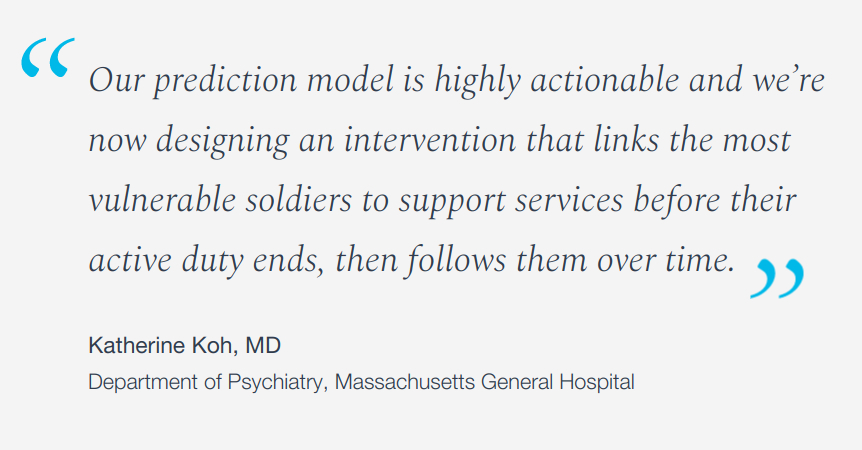A study by a Mass General-led team could lead to more targeted strategies to prevent homelessness among military personnel
Investigators led by Massachusetts General Hospital (MGH) and Harvard Medical School (HMS) have found that lifetime depression, the trauma of having a loved one murdered, and post-traumatic stress disorder (PTSD) are the three greatest predictors of homelessness among U.S. Army soldiers after transitioning to civilian life. Their study, published in the American Journal of Preventive Medicine, used an innovative machine-learning approach to accurately predict which military personnel are at greatest risk and should therefore be targeted with specific interventions to mitigate their chances of becoming homeless. 
“We’ve long been limited in our ability to predict and prevent homelessness because most approaches have been focused on helping people after they’ve become homeless, rather than taking action before it ever occurs,” says lead author Katherine Koh, MD, an investigator at MGH and for the Boston Health Care for the Homeless Program. “Our prediction model is highly actionable and we’re now designing an intervention that links the most vulnerable soldiers to support services before their active duty ends, then follows them over time.”
Currently, there are an estimated 40,000 homeless veterans in the U.S., comprising eight percent of the homeless population. In 2009, the Obama administration announced a national initiative to end veteran homelessness within five years, committing significant federal resources to the effort. While homelessness has decreased about 50 percent since then, veterans remain disproportionately represented in the homeless population, and in 2020 the number of homeless veterans increased for the first time in years.
As part of their study, MGH and other academic partners drew on data from nearly 17,000 soldiers between 2011 and 2014 as part of the Army’s STARRS-LS study, which asked questions about housing history, adverse childhood experiences, traumatic events or stressors in their lives, and physical and mental health problems. Using machine-learning versus traditional statistical methodology, researchers coded the responses to establish a model to predict who might be at the greatest risk of homelessness. Of the approximately 2,000 predictor variables the model considered, self-reported lifetime histories of depression, the trauma of having a loved one murdered, and post-traumatic stress disorder were found to be the strongest predictors.
“For the first time we’re applying to homelessness a ‘personalized medicine approach’ that leverages differences in an individual’s biology, lifestyle, and environment to determine who is at greatest risk with a higher degree of precision than ever before,” notes Ronald Kessler, Ph.D., a nationally recognized sociologist and senior author of the study. Plans call for giving soldiers nearing the end of their active duty questionnaires, he adds, that would help the U.S. Department of Veterans Affairs to identify and proactively target at-risk soldiers with case management intervention.
“The presence of veterans among the homeless population in this country is still regarded by many as a matter of public shame, and for decades wasn’t given the attention it deserves,” says Koh. “Our collaborative work is directly addressing that problem, and we believe utilizing prediction models such as the one we’ve developed could play a role in preventing homelessness not only among veterans but also other high-risk populations.”
Koh is an instructor in the Department of Psychiatry at MGH and Harvard Medical School. Kessler is a professor of Health Care Policy at Harvard Medical School. Co-authors include Murray Stein, MD, MPH, professor of Psychiatry and Public Health and vice-chair for Clinical Research in Psychiatry at the University of California San Diego, and Robert Ursano, MD, professor of Psychiatry and Neuroscience at Uniformed Services University of the Health Sciences.


 How to resolve AdBlock issue?
How to resolve AdBlock issue?